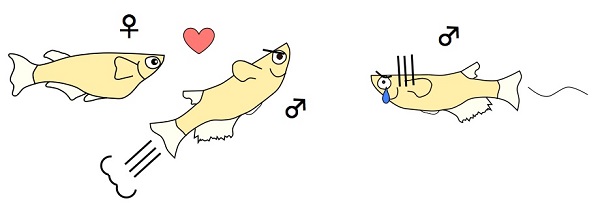Stay away from my girl Hormone for mate-guarding

A research group at the University of Tokyo Graduate School of Science including graduate student Saori Yokoi, Dr Teruhiro Okuyama (currently at the Massachusetts Institute of Technology) and Assistant Professor Hideaki Takeuchi, collaborating with researchers at the National Institute for Basic Biology, has demonstrated that in a medaka (Japanese rice fish) romantic triangle including two males and one female, one male stays with the female while at the same time guarding her from the other male (mate-guarding behavior). In addition, the research group showed that the hormone vasotocin (non-mammalian vasopressin) is required for the winning male in the triangular relationship. Mutant male medaka that cannot produce vasotocin (vasotocin-mutant males) tend to lose out in triangular relationships. Interestingly, these males exhibit normal aggression in all-male groups, but lose their motivation for courtship in dyadic relationships. Therefore, vasotocin-mutant males have low sexual motivation towards females, which may decrease or abolish competitive motivation in a love triangle.
The hormone vasopressin present in humans and other mammals is thought to have a similar physiological function as medaka vasotocin. Basic research into medaka could lead to the discovery of common hormonal systems between medaka and mammals and provide clues to the evolutionary roots of human emotions elicited in triangular relationships, such as sexual jealousy and posessiveness.
Press release (Japanese)
Paper
, "An Essential Role of the Arginine Vasotocin System in Mate-Guarding Behaviors in Triadic Relationships of Medaka Fish (Oryzias latipes)", PLOS Genetics Online Edition: 2015/2/27 (Japan time), doi: 10.1371/journal.pgen.1005009.
Article link (Publication)
Links
Biological Sciences, Graduate School of Science
Laboratory of Physiological Chemistry, Biological Sciences, Graduate School of Science







